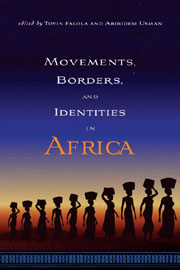Book contents
- Frontmatter
- contents
- Preface
- Introduction: Migrations in African History: An Introduction
- PART A State Formation and Migration Crossroads
- 1 Frontier Migrations and Cultural Transformations in the Yoruba Hinterland, ca. 1575–1700 The Case of Upper Osun
- 2 The Root Is Also Here: The Nondiaspora Foundations of Yoruba Ethnicity
- 3 Settlement Strategies, Ceramic Use, and Factors of Change among the People of Northeast Osun State, Nigeria
- 4 Precolonial Regional Migration and Settlement Abandonment in Yorubaland, Nigeria
- 5 Migrations, Identities, and Transculturation in the Coastal Cities of Yorubaland in the Second Half of the Second Millennium: An Approach to African History through Architecture
- PART B Movements and Identities
- List of Contributors
- Index
4 - Precolonial Regional Migration and Settlement Abandonment in Yorubaland, Nigeria
from PART A - State Formation and Migration Crossroads
Published online by Cambridge University Press: 12 September 2012
- Frontmatter
- contents
- Preface
- Introduction: Migrations in African History: An Introduction
- PART A State Formation and Migration Crossroads
- 1 Frontier Migrations and Cultural Transformations in the Yoruba Hinterland, ca. 1575–1700 The Case of Upper Osun
- 2 The Root Is Also Here: The Nondiaspora Foundations of Yoruba Ethnicity
- 3 Settlement Strategies, Ceramic Use, and Factors of Change among the People of Northeast Osun State, Nigeria
- 4 Precolonial Regional Migration and Settlement Abandonment in Yorubaland, Nigeria
- 5 Migrations, Identities, and Transculturation in the Coastal Cities of Yorubaland in the Second Half of the Second Millennium: An Approach to African History through Architecture
- PART B Movements and Identities
- List of Contributors
- Index
Summary
Introduction
Migrations have been part of human endeavor since humans' emergence as a species. As Tessie Naranjo put it, “People have moved from place to place and have joined and separated again throughout our past, and we have incorporated it into our songs, stories, and myths because we must continually remember that, without movement, there is no life.” The formation of a cultural group (e.g., family, clan, tribe, ethnic group, nation, state) in the past as well as in the present is the consequence of a dynamic and selective process of aggregation, identification, and differentiation. Africa has been a “frontier continent”—the center of population movements of different kinds, ranging from the protohistoric Bantu dispersions to the local movements immediately before colonialism.
Humans have left their original homes for various reasons. Now as in the past, population movements have occurred as a result of famines, civil wars, ethnic rivalries, political persecution, and conflicts between societies. There have been forced migrations in which the migrants have played no role in the decision to move or in the choice of the final destination. In all these instances, displaced people have had to face the problem of forging a new life in a new environment sometimes completely different from the one they have left behind. Migrations affect both the migrants and the hosts. Migrants can stimulate further migration by the displacement of indigenous population through warfare, which leads to an alteration in sociocultural and political characteristics.
- Type
- Chapter
- Information
- Movements, Borders, and Identities in Africa , pp. 99 - 125Publisher: Boydell & BrewerPrint publication year: 2009



